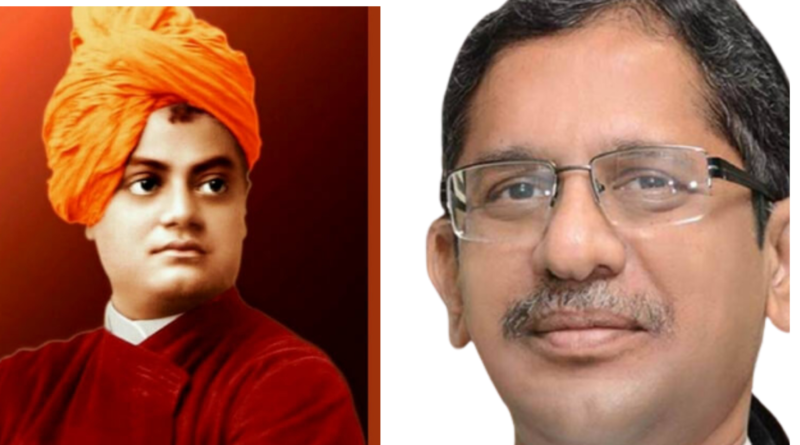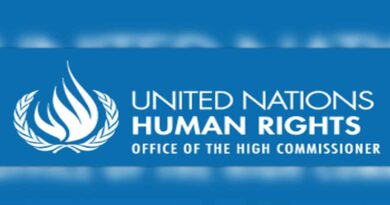To Achieve the Dream of Making Resurgent India We Should Inculcate the Ideals of Swami in Today’s Youth: CJI Ramana
(Judicial Quest News Network)
Chief Justice of India NV Ramana emulated upon the acute relevance of the teachings of Swami Vivekananda, addressing an event to make the 22nd foundation day celebrations of Vivekananda Institute of Human Excellence, Hyderabad.
He said Swamy Vivekananda advocated secularism long before constitution of India was drafted and his teachings put India back in the spotlight at a time when it was known merely as a colony of western nations.
“The democratic rights that we take today for granted are a result of the struggles of thousands of young people who took to the streets fighting
authoritarian figures either during the freedom struggle or the dark days of emergency. Many lost their lives, sacrificed lucrative careers, all for the greater good of the nation and society. Trust the youth to check the deviations in a society’s journey towards peace and progress.”
CJI NV Ramana said on the 128th anniversary of the historic Chicago address of Swami Vivekananda.
Quoting Swami Vivekananda CJI said the youth did not tolerate injustice, either to themselves or against others. They don’t compromise with their ideals, come what may. They are not only selfless but are also adventurous. They are willing to sacrifice for the cause they believe in. It is these un-adulterated minds and pure hearts which form the backbone of our nation.
He further stressed on the need for the youth to be aware of social realities and challenges.
It is imperative for the youth to be aware about the social realities and challenges. Remember, any change in the nations trajectory always stems from its youth and their participation. It is for you to build the ideal nation and society that you desire to witness. Chief Justice Ramana Said.
He further said that Swamiji’s participation in the world “Parliament of Religions” at Chicago in 1893 gave a respectable recognition to India which, at that time, was merely identified as one of the colonies. His address drew the world’s attention to ancient Indian philosophy of Vedanta. He popularized Practical Vedanta, as it preached love, compassion, and equal respect for all.
Saying the ideals of He firmly believed that the true essence of religion was the common good, and tolerance. Religion should be above superstitions and rigidities. To fulfil the dream of making resurgent India through the principles of common good and tolerance, we should instil the ideals of Swami Ji in today’s youth. I want to utilize this time in reflecting on the huge potential of the youth in our country, and the ways in which we can achieve the greater good.
He said that History is a witness to the power wielded by the youth. The story of India’s freedom struggle would be incomplete, without the names of youth leaders like BIR-SA Munda- the young tribal leader who mobilized the tribal community against the formidable British regime and secured their land rights; or the trio of Bhagat Singh, Sukhdev and Rajguru who valiantly fought for a free India till their last breath. The inspiring tales of Manyam Veerudu- Alluri Sitarama Raju, the revolutionary leader who was shot during the resistance movement still continues to inspire generations.
“Swami Vivekananda believed that youngsters in India are the chain that binds our past to a greater future. He believed that anything is possible if one has the required belief. Even impossible things will become possible if a person has self-belief and the motivation to achieve the same.” Said CJI.
Education and awareness constitute key components of empowerment. I come from a rural background. We struggled to educate ourselves. Today resources are available at your fingertips. There is unlimited access to a world of information. Said the CJI.
The CJI also noted that “India is a fast-growing nation with a vibrant economy. A survey has revealed that more than 45% of India’s population is youth. Nearly 65% of our country’s total population is between the age group of 15 to 35. This age group constitutes the youth, which is the age of discovery and dreams. Swami Vivekananda believed that youngsters in India are the chain that binds our past to a greater future. He believed that anything is possible if one has the required belief. Even impossible things will become possible if a person has self-belief and the motivation to achieve the same.”
You must know the social ills and contemporary issues facing the society and the polity. Read books to expand your vision and diversify your opinion. Although these days we have multiple tools to keep ourselves engaged within the four walls of our house, yet we should take time to step outside. Focus on your health and engage in physical activities and sports. Visit the slums to be conscious about the divides
that exist even within urban spaces. Visit villages to be aware about rural living.
The Chief Justice of India further stated Education and awareness constitute key components of empowerment. I come from a rural background. We struggled to educate ourselves. Today resources are available at your fingertips. There is unlimited access to a world of information. These advantages come with a heavy burden. The hyper awareness that modern society allows, with the ease of flow of information mandates that students are more socially and politically aware.
You must know the social ills and contemporary issues facing the society and the polity. Read books to expand your vision and diversify your opinion. Although these days we have multiple tools to keep ourselves engaged within the four walls of our house, yet we should take time to step outside. Focus on your health and engage in physical activities and sports.
Emphasising on the values of educational institutions CJI said they have a huge role to play. They must inform and create awareness in the student body about the rights and restrictions. They should promote and transmit a culture of lawfulness, of respect for the law. Institutions should equip young minds with knowledge about their rights and duties and empower them to be change-makers in society.



